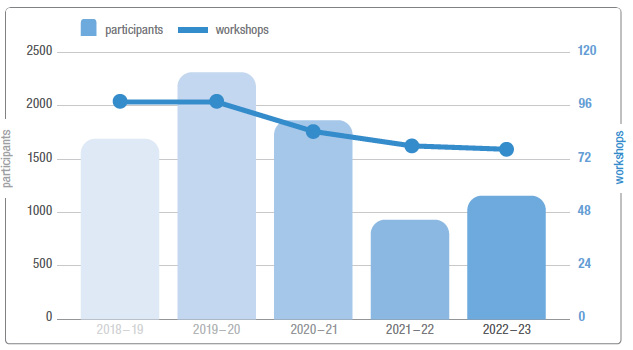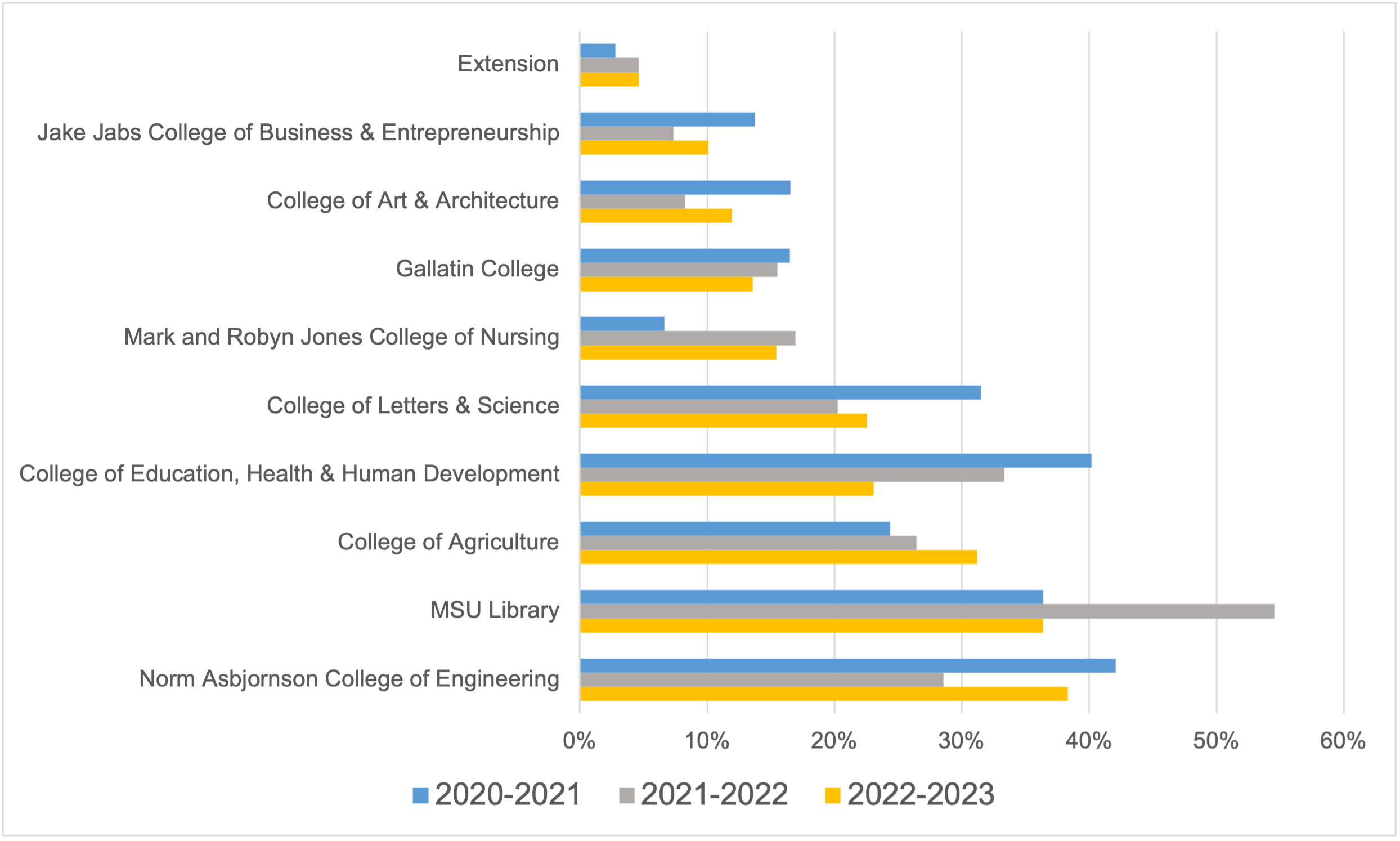Annual Report 2022-2023
Download a PDF version of the annual report
Areas
- Workshop participation
- Participants by College
- Consultations
- Programs
- Teaching & Advising
- Research & Scholarship
- Grants
- Collaborations
Workshop Participation
GOAL 3.3: Foster a culture of collaboration, continuous improvement and individual growth
|
Number of Workshops |
Number of Attendees |
|
|
Fall 2021 |
||
|
Teaching |
15 |
250 |
|
Research |
4 |
38 |
|
Diversity & Inclusion |
9 |
97 |
|
Other |
16 |
123 |
|
TOTAL |
44 |
508 |
|
Spring 2022 |
||
|
Teaching |
10 |
130 |
|
Research |
11 |
109 |
|
Diversity & Inclusion |
6 |
143 |
|
Other |
9 |
71 |
|
TOTAL |
36 |
453 |
|
|
|
|
|
2021-2022 TOTAL |
80 |
961 |
|
2020-2021 TOTAL |
83 |
1825 |
|
2019-2020 TOTAL |
102 |
2318 |
|
2018-2019 TOTAL |
99 |
1699 |

Participation by College
| College/Unit | 2020-2021 | 2021-2022 | 2022-2023 |
| College of Letters & Science | 32% | 20% | 23% |
| College of Agriculture | 24% | 26% | 31% |
| Norm Asbjornson College of Engineering | 42% | 29% | 38% |
| College of Education, Health & Human Development | 40% | 33% | 23% |
| Mark and Robyn Jones College of Nursing | 7% | 17% | 15% |
| Gallatin College | 17% | 16% | 14% |
| College of Art & Architecture | 17% | 8% | 12% |
| Jake Jabs College of Business & Entrepreneurship | 14% | 7% | 10% |
| MSU Library | 36% | 55% | 36% |
| Extension | 3% | 5% | 5% |
College participation over the last three years

Consultations
The Center’s workshop attendance number was at an all time low with 961 attendees.
|
Academic Year |
Number of Teaching Consultations |
Individuals Receiving Teaching Consultations |
Number of Research Consultations |
Individuals Receiving Research Consultations |
Total Number of Consultations |
|
2021-2022 |
41 |
36 |
28 |
20 |
69 |
|
2020-2021 |
52 |
37 |
37 |
30 |
89 |
|
2019-2020 |
42 |
32 |
37 |
34 |
79 |
|
2018-2019 |
39 |
33 |
40 |
26 |
79 |
Programs
Faculty Learning Communities
|
|
New Faculty Orientation
New Faculty Orientation was held August 10 and 11, 2021 in Inspiration Hall in the Norm Asbjornson Hall and online and January 7, 2022. 75 attended total (28 tenure-track, 25 non-tenure track).
Early Career Faculty Mentoring Program
The year-long Early Career Faculty Mentoring Program had 16 matches.
The CFE fosters a network of mentors and connects incoming faculty to more senior faculty members to help navigate the academic experience and help with strategies to achieve best practices and attain career success at MSU. Mentorship also includes access to the National Center for Faculty Development and Diversity’s network of mentors.
Certificates of Completion
- Fourteen individuals earned the Certificate of Teaching Enhancement.
- One individual earned the Early Career Success Certificate.
- 15 faculty were recognized as new members of the Center.
-
One earned a Diversity, Equity & Inclusion Certificate.
Faculty Symposium
"Learn innovative and impactful teaching strategies from your peers"
The Center held a University-wide Faculty Symposium on January 24, 2023 with 73 attendees. The 100% of the respondents to a feedback survey strongly agreed/agreed that they thought it was time well spent.
Teaching and Advising
- GOAL 1.1: Broaden access for underrepresented populations and increase academic success for all students through excellence in undergraduate education.
- GOAL 1.3: Implement evidence-based high quality, high impact teaching and learning practices for every student
Instructional Innovation Grants
Four Teaching Innovation Grants were awarded to five faculty members .
Beth Shirley and Rebecca Jones, English
"Bitterroot Magazine"
Rachel Frost, Animal & Range Sciences
"Developing a Relevant Case Study Library for Range Management"
Paul Gannon, Chemical and Biological Engineering
"Effectively Engaging Students in Group Video Projects"
Ashley Fuchs, Art
"Typographic Printing Detox"
2023 Faculty Founder's Day Awards
President’s Excellence in Teaching Award
Linda Karell, an associate professor in the Department of English
Teaching Innovation Award
Myleen Leary, an associate professor in the Jake Jabs College of Business and Entrepreneurship.
President’s Award for Excellence in Service Learning
- GOAL 2.1: Enhance the significance and impact of scholarship
- GOAL 2.2: Expand interdisciplinary scholarship
- GOAL 2.3: Strengthen institutional reputation in scholarship
- 37 Faculty Excellence Grants were awarded.
- 16 faculty and staff participated in Grant-Writing Bootcamp.
- 2 faculty were awarded the NSF CAREER grant.
Grants
Values-based Academic Leadership Trajectories for Women in STEM (VAuLTS)
Building on the success of ADVANCE Project TRACS, the Center for Faculty Excellence has joined with the NSF Northwest ADVANCE Partnership to pilot leadership and mentoring programs for midcareer women faculty in STEM/Social and Behavioral Sciences (SBS), called VAuLTS. This research grant seeks to address systemic barriers women face on the path to the highest ranks of professoriate in diverse higher education settings. MSU PI Nika Stoop
Kern Entrepreneurial Engineering Network (KEEN)
The “Entrepreneurial Thinking in Engineering Education” grant has the goal of graduating engineers equipped not only with technical skills but also an entrepreneurial, can-do approach to their profession, according to William Schell, associate director of MSU's Montana Engineering Education Research Center. The funding supports faculty development and interdisciplinary research on engineering education. PI Brock LaMeres
IMPACT STEM Transfer
Inclusive And Meaningful Partnerships for Cultivating Transformation in STEM Transfer, from Howard Hughes Medical Institute. PI Mari Eggers
HOPE & CAIRHE 2gether (HC2) Center
HC2 is part of a dual-institution center funded by the National Cancer Institute (U54CA280812) to address cancer prevention and control in areas of persistent poverty. The CFE is involved in the Career Advancement Core that provides training and mentored research opportunities for a cadre of early career investigators (HC2 Scholars) through a seminar series, tailored mentoring and individualized learning experiences. MSU co-PI Nika Stoop
Collaborations
The Center has continued its many collaborations focused on faculty excellence and student success. A couple collaborations are highlighted here:
Writing Center– Erin Strickland – This year, we collaborated with the Writing Center Assistant Director, Erin Strickland on two programs, “Mentoring through the writing process” and “Faculty Book Club: Air & Light & Time & Space by Helen Sword.” The mentoring workshop brought graduate students and their mentors together to discuss working with writers through the academic writing process. The book club worked through the sections of Air & Light & Time & Space and reflected on the participants’ current habits and identify possible ways to shift to more balanced and productive writing practices.
Mentoring through the writing process:
Participants said that setting aside time to discuss student and mentor relationships
was valuable and that interacting with each other in a different context helped to
understand each other's needs and expectations. They would've liked more dedicated
time to make concrete plans for moving forward, particularly in order to complete
the expectations document we started as a group.
Air & Light & Time & Space
Participants appreciated hearing other people's experiences, approaches, and perspectives
on writing. It was a great way to create community across disciplines and sparked
deeper reflection on their own personal writing habits. They would've appreciated
more time to get to know one another, so we are going to continue to meet this summer
and write together.
DEDL (Developing Excellence in Department Leadership) – Michelle Miley – is a program tailored to serve the needs of new unit leaders (within their first 2-3 years) including but not limited to department heads and school directors. The purpose of the program is to provide both training and support for those in some of the most challenging jobs on campus.
DEDL met twice each month. One monthly meeting was dedicated to sharing challenges, problem solving, and providing mutual support amongst the participants. The second monthly meeting was more of a workshop, covering timely topics to help unit leaders learn about and navigate the complexity of their jobs.
Other notable collaborations involved:
- Office of the Provost & Academic Affairs
- Graduate School
- Office of Research Development
- MSU Library
- Office of Diversity and Inclusion
- Office of Planning & Analysis
- Academic Technology & Outreach
- University Studies/Academic Advising Center
- Writing Center
- Disability Services
- Leadership Institute
- Facilities/ Campus Planning, Design & Construction
- Montana Engineering Education Research Center/ KEEN
- Office of International Programs
